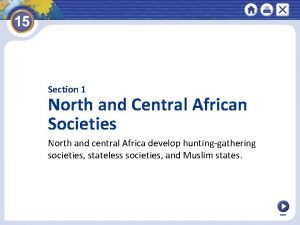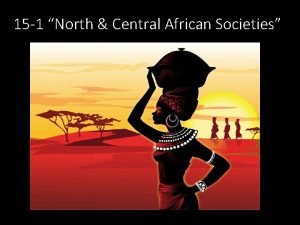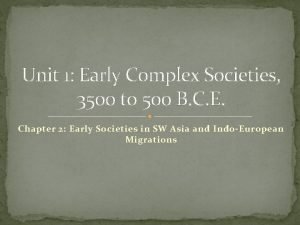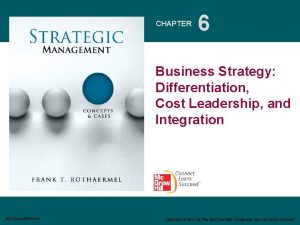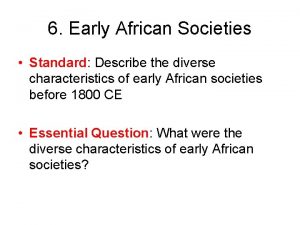Early African Societies Focus Questions Focus Questions 1









- Slides: 9

Early African Societies Focus Questions

Focus Questions 1. What were the connections between climate, agriculture, and the Nile River in the development of Egypt and Nubia? 2. How did Egypt develop from unification to the fall of the New Kingdom? 3. What caused the emergence of cities and stratified societies? 4. What were the significant aspects of Egyptian economic specialization and trade and the development of early writing? 5. What were the key features of Egyptian religious traditions? 6. What were the causes and effects of the Bantu migrations?

What were the connections between climate, agriculture, and the Nile River in the development of Egypt and Nubia? • The Sahara was once a fertile grassland with rivers and lakes, which allowed the cultivation of yams, gourds, watermelons, and cotton, in addition to the domestication of sheep and goats. • Climate change made the region hotter and drier, so people were forced to gather around the Nile River, which flooded annually bringing in fertile soil that sustained agriculture in the region • Egypt developed in the north (the lower Nile) and Nubia in the south (the upper Nile) • The Nile flows from south to north.

How did Egypt develop from unification to the fall of the New Kingdom? • Menes the Conqueror unified a large centralized state around 3100 BCE and established his capital, Memphis. - OLD KINGDOM: Pharaohs were considered gods and built elaborate tombs, including pyramids. • At the end of the MIDDLE KINGDOM, Egypt were invaded by the Hyksos. After driving them out, the NEW KINGDOM was established. • The New Kingdom fell to the Nubians. The Assyrian invasion followed (the same one experienced by the Mesopotamians) and a pattern of foreign domination developed.

What caused the emergence of cities and stratified societies? • Cities such as Memphis and Thebes developed along the Nile and grew to political, cultural, and economic centers. • Since the Pharaoh was the single supreme leader, there was no noble class. Instead, Military and government officials (bureaucracy) were held in high social standing. • An urban middle class of artisans as well as a lower class of peasants and slaves also developed. • Still patriarchal, but women in Egypt held more rights than in Mesopotamia: could become priestesses, scribes, and one, Queen Hapshetsut, co-ruled Egypt

What were the significant aspects of Egyptian economic specialization and trade and the development of early writing? • Long distance land see trade routes developed and gave Egyptians access to goods from Nubia, Ethiopia, and the Middle east. • Egyptian cotton, pottery, and wine were traded for ivory, ebony, animal skins, gold, and slaves. Trees were even imported from the middle east. • Writing may have first been borrowed from Mesopotamia and then developed independently into hieroglyphs that were carved into monuments as well as written on papyrus • Being a professional scribe was a prestigious position.

What were the key features of Egyptian religious traditions? • Polytheistic • Some gods were seen as more important than others • Sun gods Amon and Re • Osiris- the god of the underworld • Temple complexes employed hundreds of people in in worshiping certain gods • Most important religious contribution: Our only view into what early societies thought about the afterlife. • Mummification believed to help people into immortality. First only for the Pharaoh, then for wealthy families.

What were the causes and effects of the Bantu migrations? • The Bantu had mastered farming and iron metallurgy, which led to population increases and forced the Bantu to spread out due to population pressure. As they did, they also spread their knowledge of agriculture, iron, language and their religion • Believed in a creator god, local spirits, and ancestor worship. This forms the foundation of what is commonly called “Traditional African Religion”

Early African Societies Focus Questions
 North and central african societies
North and central african societies Family and government of west africa in 1492
Family and government of west africa in 1492 North and central african societies
North and central african societies The early complex societies 3500 to 500 b.c.e
The early complex societies 3500 to 500 b.c.e For adult
For adult Porters generic competitive strategies
Porters generic competitive strategies Drivers of differentiation
Drivers of differentiation Actor focus vs object focus
Actor focus vs object focus Pearson education
Pearson education Early cpr and early defibrillation can: *
Early cpr and early defibrillation can: *
